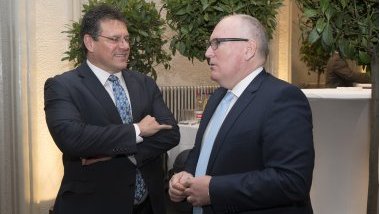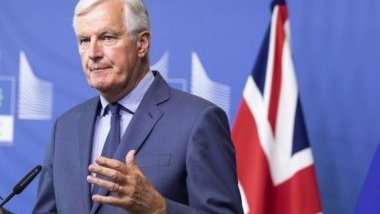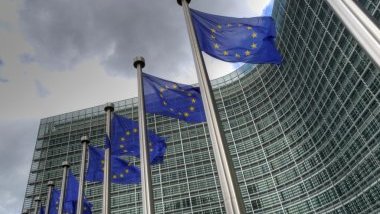Two weeks after announcing his candidacy to be the EPP’s lead candidate, Alexander Stubb unveiled the campaign platform at the heart of the European quarter in Brussels. He outlined his political visions, with an eight-page document, for “the next generation of Europe”.
It’s a vision that puts “European values” at the heart of the former Finnish Prime Minister’s campaign; human rights, equality, tolerance, rule of law, liberal democracy. Stubb believes many of these are “under attack from both inside and outside the European Union”, and that need to be strongly defended. A declaration unambiguously targeted at his EPP colleagues – Fidesz, the party of the Hungarian Prime Minister Viktor Orbán.
For the Vice-President of the European Investment Bank – who took a leave of absence from his position for the duration of the EPP’s internal campaign – two fundamentally transnational challenges face our generation: the digital revolution and climate change, and “no single country can tackle on its own” these two issues. Stubb doesn’t offer many concrete measures in his programme yet – which, according to him, would have been “counterproductive at this stage”. But, a few key elements, however, emerge from this first document.
Taking over the leadership of the digital revolution is the first objective of Stubb, who does not accept that “currently all of the top 20 technology firms are from the US or China”. In response, he highlights the need to invest in education, innovation and R&D to reverse this trend. At the same time, the protection of European citizens’ personal data and online privacy are the other cornerstones of the candidate’s digital policy. In his programme, he is convinced that the EU can, and must, take the initiative to boost international rules and standards regarding artificial intelligence and robotisation, reflecting European values.
Growth and prosperity for all Europeans is the second strand of Stubb’s programme. He believes that the growing populism on the continent has been fed by a feeling of injustice and wariness towards our model of society, combining market social economy and globalisation. Liberal from an economic standpoint, Stubb wants to ensure the EU continues being a champion of free and fair trade while fighting unfair practices that harm European stakeholders in the international arena. When it comes to the euro, Stubb wants to herald in a number of reforms to deepen integration, calling for an increase of the pace of creating a banking and capital markets union and establishing a European Monetary Fund.
Concerning climate change, Stubb’s aim is clear: a carbon-neutral Europe by 2045. If Stubb sees the Paris Agreement as a good beginning, he thinks being “more ambitious” is necessary. Moreover, he is counting on and promoting the innovative spirit of European firms to develop new technologies to contribute to this collective effort.
Managing migration and security are the two final elements outlined – albeit briefly – in the eight-page policy document of the Finnish candidate’s programme. While populist groups across Europe have taken advantage of the migration crisis since 2015 to cry out against a “sieve-like Europe”, Stubb refuses to give in to scaremongering. For him, “it is time to show all Europeans that the situation is under control” while making sure that the situation of 2015 won’t happen again. In his programme, he points out that “Europe needs immigration which is controlled and legal”, considering that “with an ageing population and shortage of skilled labour, we will not be able to survive by building walls”. From this position, a strengthening of Europe’s external borders is required. Decisive policies such as the reinforcement of Frontex, the establishment of asylum centres outside the EU in cooperation with the UNHCR, or the establishment of quotas per member states for humanitarian asylum applications would be needed. But without excluding the possibility for the creation of a system of “flexible solidarity” between the EU member states.
Regarding European security and defence, Stubb intends to be as ambitious. Although a convinced Atlanticist, he is conscious that the “voluntary marginalisation of the United States from world politics means that we must take more responsibility for our own security”. Thus, he calls on “member states and European institutions [to] step up their efforts to build a true Security and Defence Union”. Creating an EU artificial intelligence security strategy and taking further steps to improve the efficiency and competitiveness of Europe’s defence technological and industrial base are some of Alexander Stubb’s current objectives.
On the basis of these ambitious policies, the Finnish candidate must now attempt to convince the 735 delegates of the EPP who will elect their Spitzenkandidat for the European elections during their Congress in Helsinki on 8 November. A three-week marathon that does not seem to scare the 50-year-old Nordic triathlete.
The question which still arises is whether, after the European elections next May, the heads of state and government will accept and propose the Spitzenkandidat of the triumphant of the European political party as European Commission President – which is not an obligation under the European Treaties but was welcomed in 2014 as an enhancement of the democratic process.
Translator’s note: The Lisbon Treaty establishes that the European Council (i.e. the Heads of state and government of the EU member states) has to “take into account the elections to the European Parliament” to “propose to the European Parliament a candidate for President of the Commission”, a candidate that then needs to be elected by the European Parliament to become Commission President. In practice, after the 2014 European elections, this led to the election of the Spitzenkandidat of the party which won the elections, i.e. Jean-Claude Juncker for the EPP.
The democratic progress had three important characteristics. First, the Commission President was elected by the European Parliament, and not simply approved. Second, as the elections to the European Parliament must be taken into account, it means that the European citizens’ votes do not only directly elect their MEPs, but also indirectly the Commission President. Third, the Spitzenkandidaten and their parties are (in theory) known during the electoral campaign, which provides the citizens with the opportunity to compare European political figures and programmes before the vote.





Follow the comments: |
|
